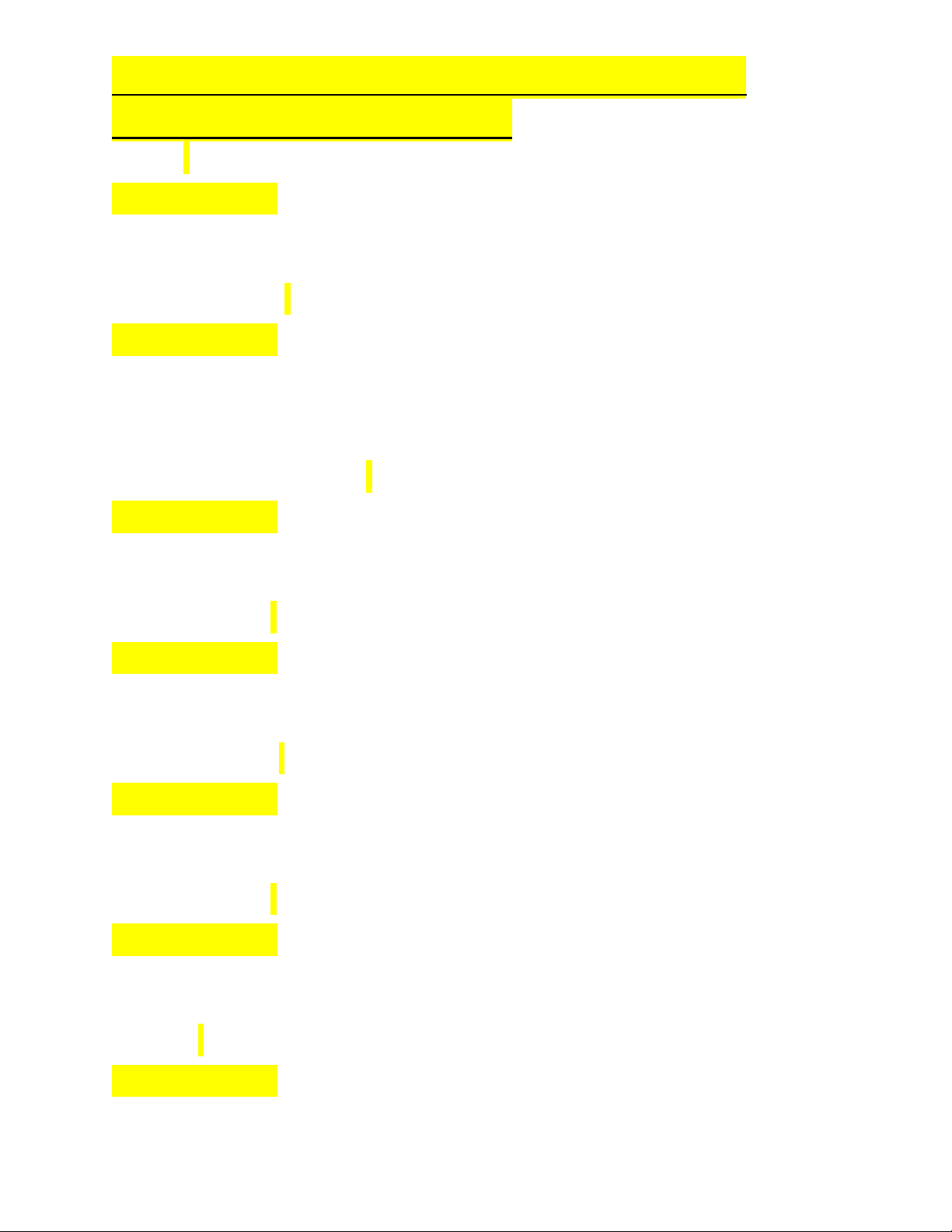
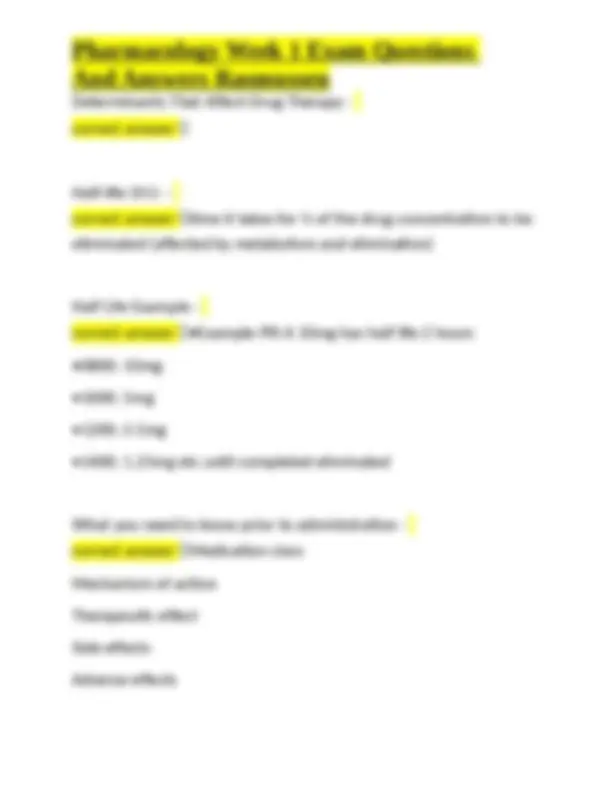
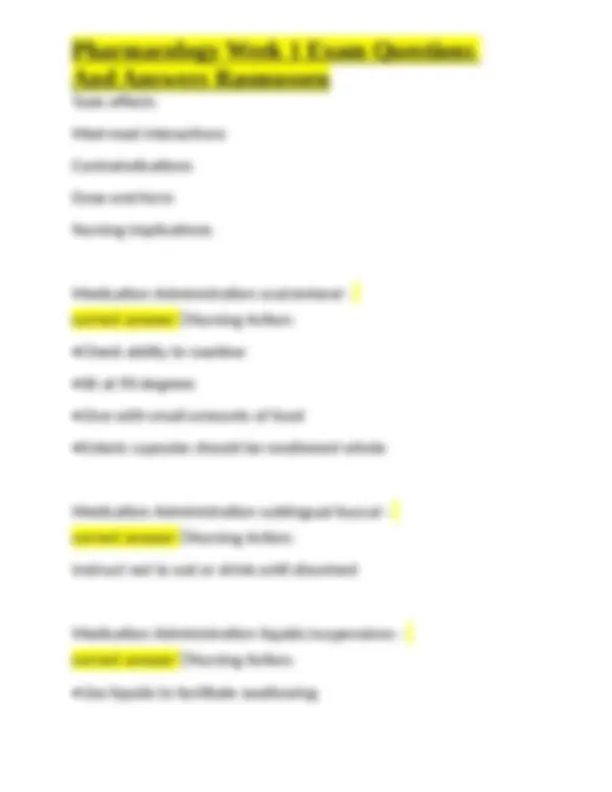
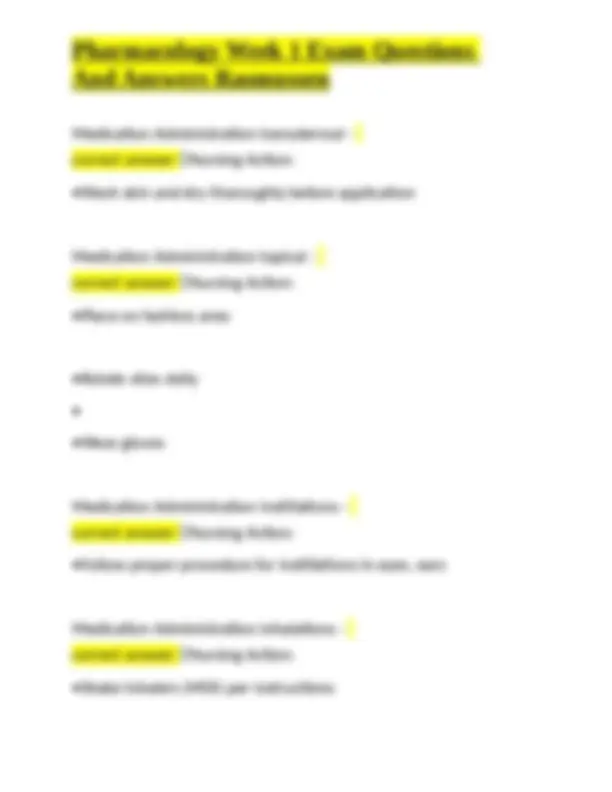
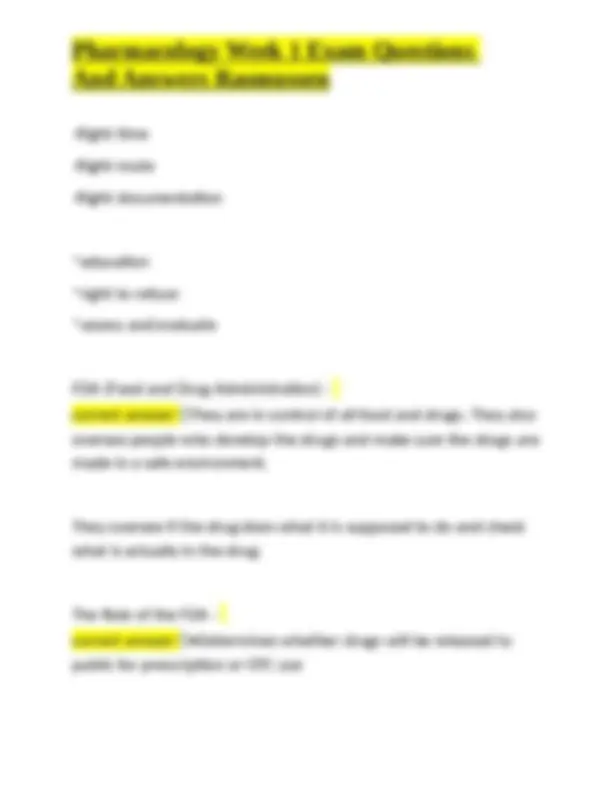
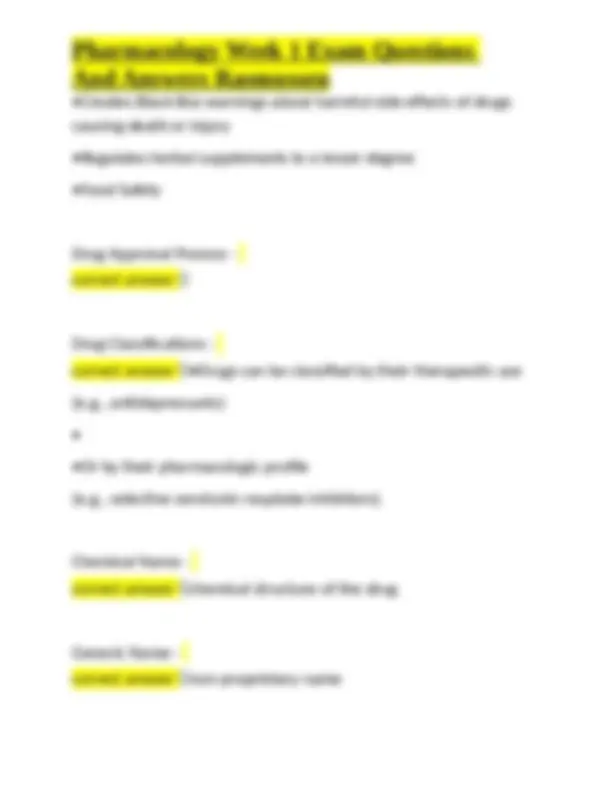
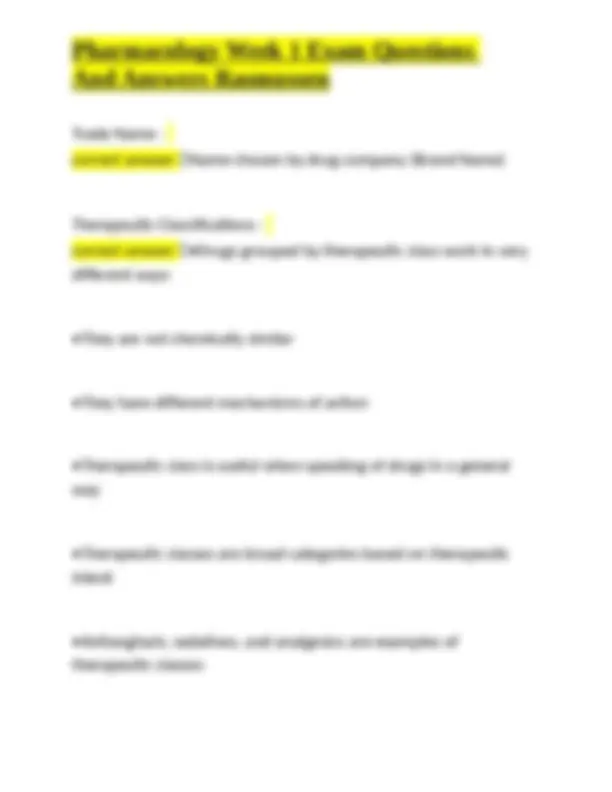
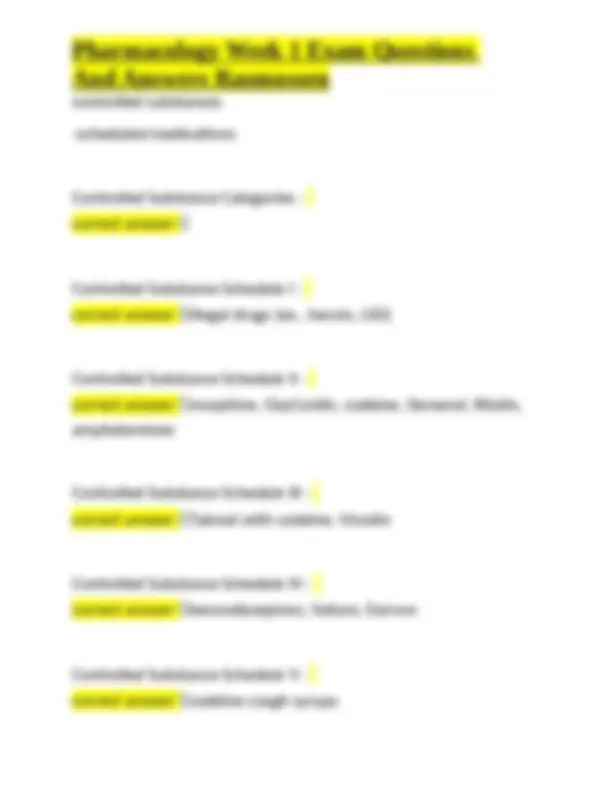
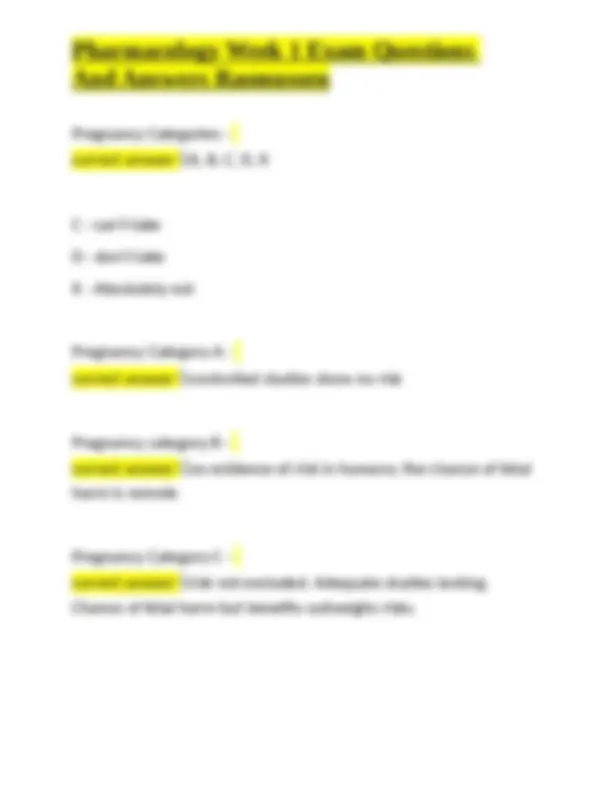
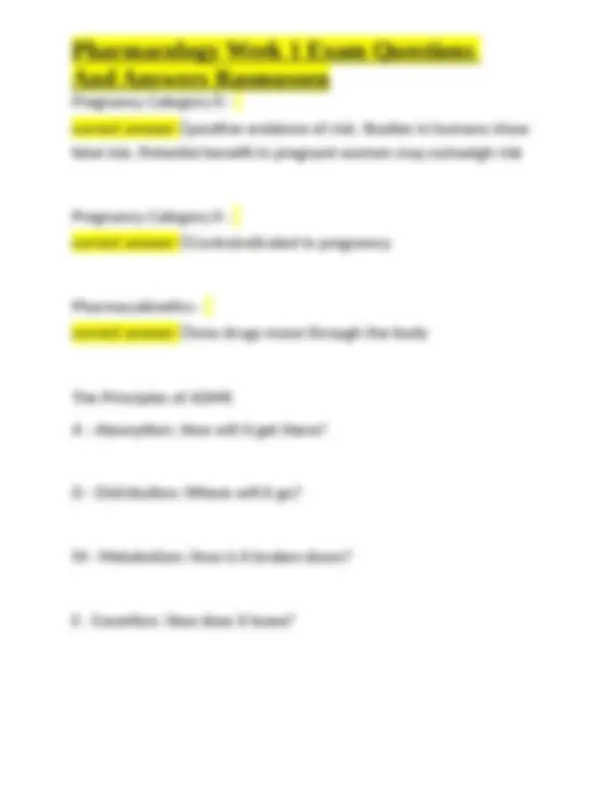
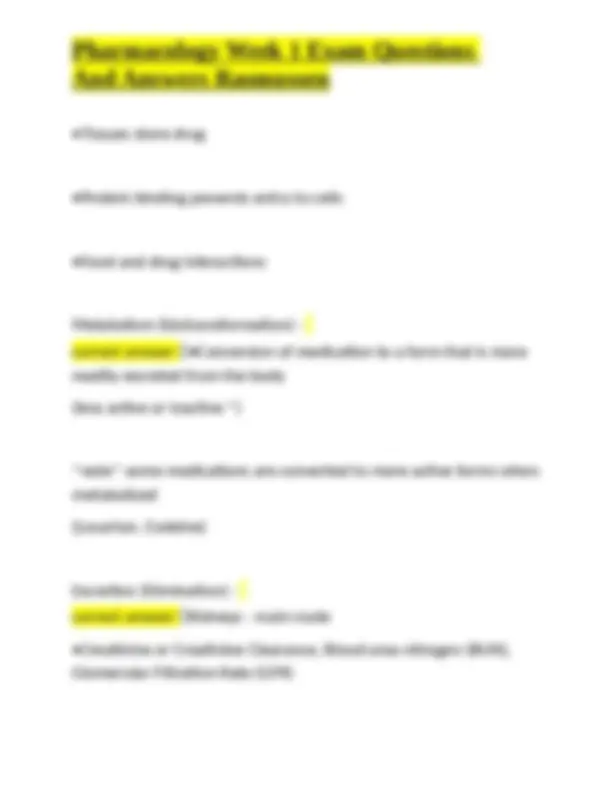
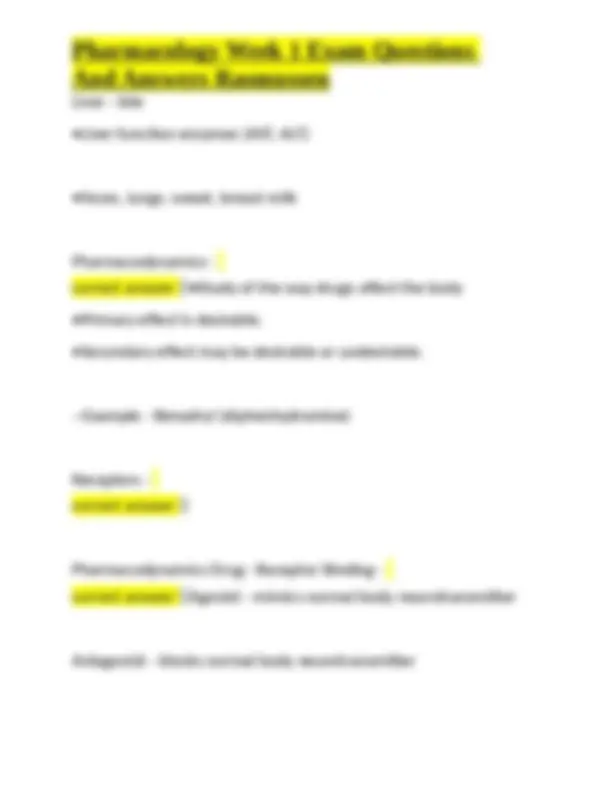
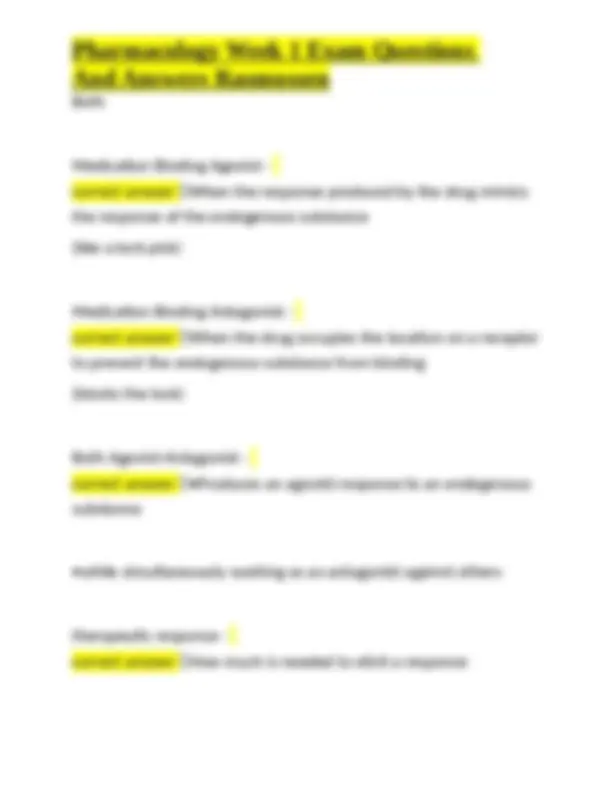
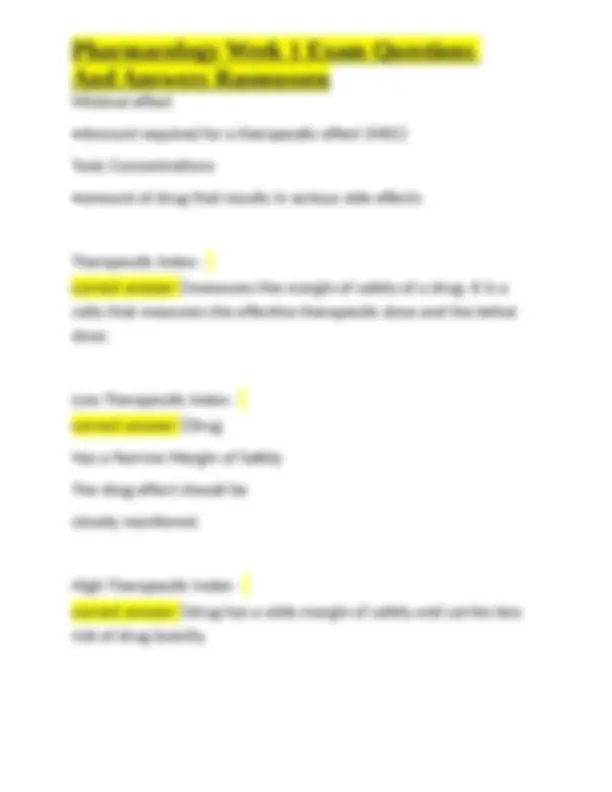
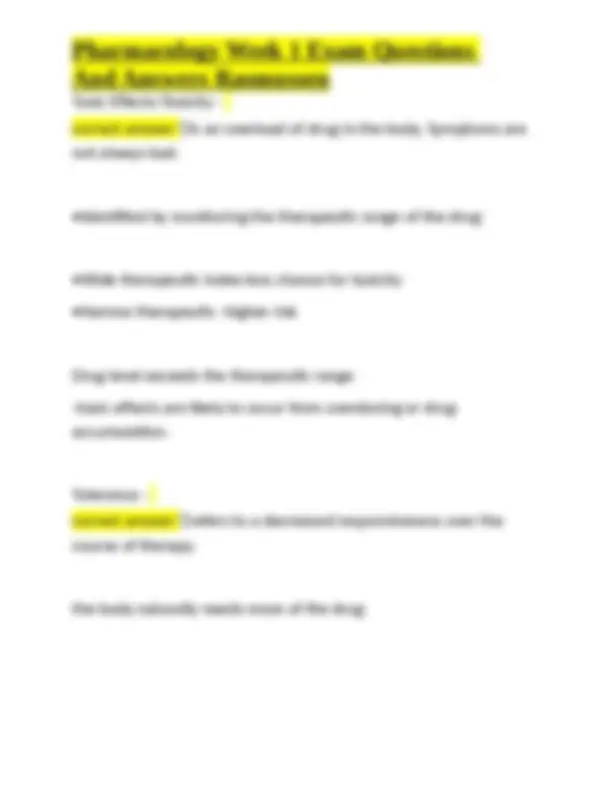
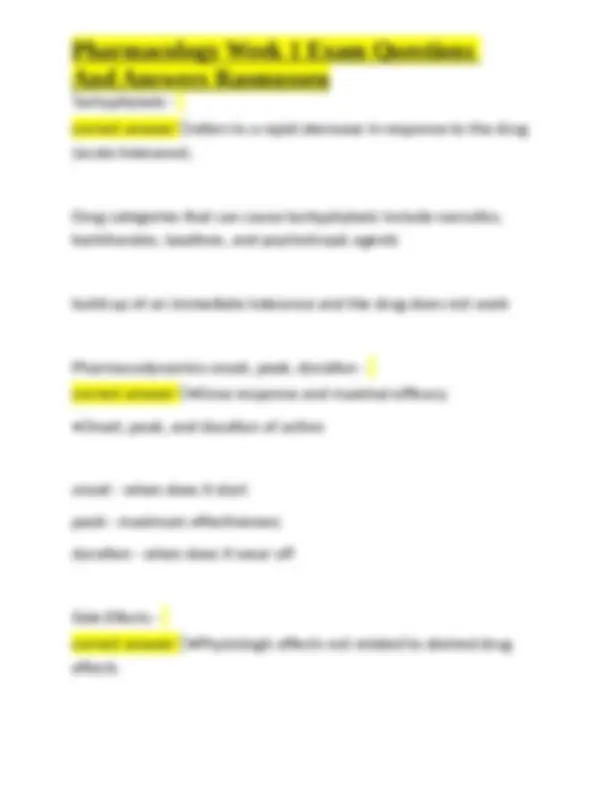
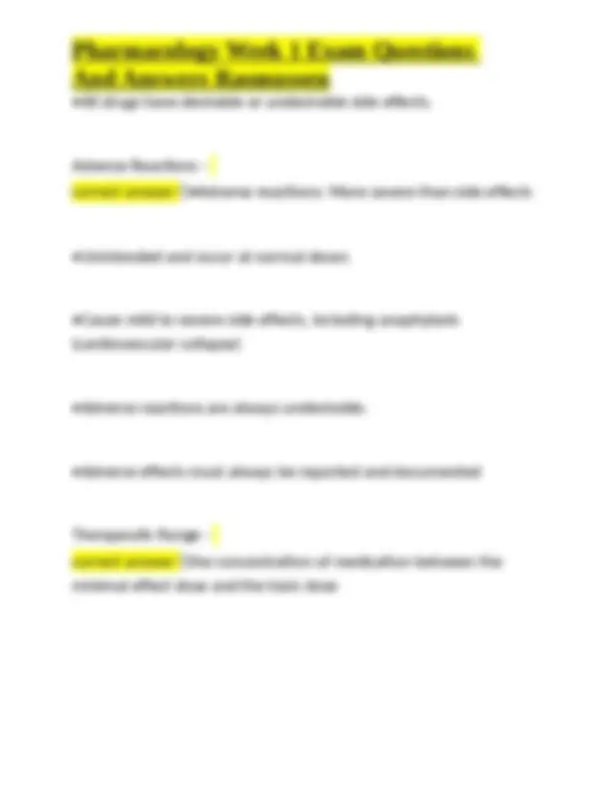


Study with the several resources on Docsity

Earn points by helping other students or get them with a premium plan


Prepare for your exams
Study with the several resources on Docsity

Earn points to download
Earn points by helping other students or get them with a premium plan
Community
Ask the community for help and clear up your study doubts
Discover the best universities in your country according to Docsity users
Free resources
Download our free guides on studying techniques, anxiety management strategies, and thesis advice from Docsity tutors
Pharmacology Week 1 Exam Questions And Answers Rasmussen
Typology: Exams
1 / 24

This page cannot be seen from the preview
Don't miss anything!

















Drug - correct answer ✅Any Chemical the Alters the Body Pharmacology - correct answer ✅The study of the chemical, biological, and physiological effects of drugs Clinical Pharmacology - correct answer ✅studying the effects of drugs on humans Therapeutics - correct answer ✅studying the use of drugs to treat disease The Big Three - correct answer ✅Effectiveness, Safety, and Selectivity Effectiveness - correct answer ✅Did it work Safety - correct answer ✅A safe drug causes no harm
All drugs can be harmful Selectivity - correct answer ✅A drug that only produces the desired effect Factors that contribute to intensity of drugs in the body - correct answer ✅•Gender •Ethnicity •Weight •Adipose tissue •Kidney Function •Liver Function •Age •Food/NPO •Dose •Genetics •½ life
Toxic effects Med-med interactions Contraindications Dose and form Nursing implications Medication Administration oral/enteral - correct answer ✅Nursing Action: •Check ability to swallow •Sit at 90 degrees •Give with small amounts of food •Enteric capsules should be swallowed whole Medication Administration sublingual/buccal - correct answer ✅Nursing Action: instruct not to eat or drink until dissolved Medication Administration liquids/suspensions - correct answer ✅Nursing Action: •Use liquids to facilitate swallowing
Medication Administration transdermal - correct answer ✅Nursing Action: •Wash skin and dry thoroughly before application Medication Administration topical - correct answer ✅Nursing Action: •Place on hairless area •Rotate sites daily
•Wear gloves Medication Administration instillations - correct answer ✅Nursing Action: •Follow proper procedure for instillations in eyes, ears Medication Administration inhalations - correct answer ✅Nursing Action: •Shake inhalers (MDI) per instructions
•Rotate injection sites Medication Administration SUBQ and IM - correct answer ✅Nursing Action: •Subq: select sites with adequate fat tissue Medication Administration IV - correct answer ✅Nursing Action: observe immediately for reactions Medication Administration epidural - correct answer ✅Nursing Action: •Discard all sharps in appropriate containers Rights of Medication Administration - correct answer ✅-Right client: 2 patient identifiers -Right medication: compare MAR 3 times -Right dose: normal/correct order
-Right time -Right route -Right documentation *education *right to refuse *assess and evaluate FDA (Food and Drug Administration) - correct answer ✅They are in control of all food and drugs. They also oversee people who develop the drugs and make sure the drugs are made in a safe environment. They oversee if the drug does what it is supposed to do and check what is actually in the drug. The Role of the FDA - correct answer ✅•Determines whether drugs will be released to public for prescription or OTC use
Trade Name - correct answer ✅Name chosen by drug company (Brand Name) Therapeutic Classifications - correct answer ✅•Drugs grouped by therapeutic class work in very different ways •They are not chemically similar •They have different mechanisms of action •Therapeutic class is useful when speaking of drugs in a general way •Therapeutic classes are broad categories based on therapeutic intent •Antianginals, sedatives, and analgesics are examples of therapeutic classes
•Therapeutic classes include several pharmacologic classes •The therapeutic class anti-hypertensives has at least 13 pharmacologic classes Pharmacological Classification - correct answer ✅•Pharmacologic classification is based on mechanism of action •Includes only those drugs that have the same or similar mechanism of action •For example, "angiotensin-converting enzyme inhibitors" (ACE inhibitors) tell you exactly how the drugs work—they inhibit the enzyme that converts angiotensin I to angiotensin II Drugs in a Pharmacologic Class Have Similar Attributes - correct answer ✅•Indications •Mechanism of action •Contraindications and precautions •Interactions •Adverse reactions and side effects
controlled substances -scheduled medications Controlled Substance Categories - correct answer ✅ Controlled Substance Schedule I - correct answer ✅illegal drugs (ex., heroin, LSD) Controlled Substance Schedule II - correct answer ✅morphine, OxyContin, codeine, Demerol, Ritalin, amphetamines Controlled Substance Schedule III - correct answer ✅Tylenol with codeine, Vicodin Controlled Substance Schedule IV - correct answer ✅benzodiazepines, Valium, Darvon Controlled Substance Schedule V - correct answer ✅codeine cough syrups
Pregnancy Categories - correct answer ✅A, B, C, D, X C - can't take D - don't take X - Absolutely not Pregnancy Category A - correct answer ✅controlled studies show no risk Pregnancy category B - correct answer ✅no evidence of risk in humans; the chance of fetal harm is remote Pregnancy Category C - correct answer ✅risk not excluded. Adequate studies lacking. Chance of fetal harm but benefits outweighs risks.
Absorption - correct answer ✅Occurs through: skin mucous membranes GI tract respiratory tract Absorption Barriers - correct answer ✅◦Affected by blood flow in GI tract, stress, hunger, fasting, food, pH, GI disease ◦First-pass effect : drugs pass from intestinal tract to liver first ◦Bioavailability - percentage of drug that reaches systemic circulation Affected by drug form, route of administration, GI mucosa and motility, food and other drugs, liver dysfunction
first pass effect - correct answer ✅drugs pass from intestinal tract to liver first Oral
Liver - bile •Liver function enzymes (AST, ALT) •Feces, lungs, sweat, breast milk Pharmacodynamics - correct answer ✅•Study of the way drugs affect the body •Primary effect is desirable. •Secondary effect may be desirable or undesirable. --Example - Benadryl (diphenhydramine) Receptors - correct answer ✅ Pharmacodynamics Drug - Receptor Binding - correct answer ✅Agonist - mimics normal body neurotransmitter Antagonist - blocks normal body neurotransmitter
Both Medication Binding Agonist - correct answer ✅When the response produced by the drug mimics the response of the endogenous substance (like a lock pick) Medication Binding Antagonist - correct answer ✅When the drug occupies the location on a receptor to prevent the endogenous substance from binding (blocks the lock) Both Agonist-Antagonist - correct answer ✅•Produces an agonist response to an endogenous substance •while simultaneously working as an antagonist against others therapeutic response - correct answer ✅How much is needed to elicit a response